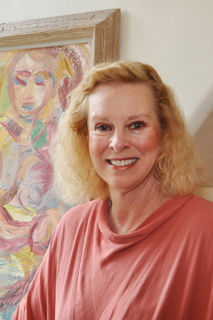As the 2011-12 Penn State Laureate, Linda Miller has been crisscrossing the Commonwealth sharing her enthusiasm for the humanities with a wide variety of audiences, including students, faculty, staff and friends of Penn State campuses. In her travels, Miller, a professor of English at Penn State Abington, shares her knowledge of and passion for American writers and artists of the early 20th century.
As Penn State Laureate, Miller is assigned half-time for one academic year to bring an enhanced level of social, cultural, artistic and human perspective and awareness to communities across Pennsylvania. Miller is the first laureate to be chosen from a Commonwealth campus, Penn State Abington, and the first one from the study of humanities. To date, she has visited 16 of Penn State's 24 campuses (more visits are scheduled for this spring) to give presentations, participate in English classes and share her expertise.
During a recent visit to Penn State Wilkes-Barre, Miller discussed Ernest Hemingway's short story, "Indian Camp," with students. Christine Berzsenyi, English professor and coordinator of the Letters, Arts and Sciences program at the campus, said Miller's visit served as a learning experience for the entire class.
"As the instructor (of the class Miller attended), I sincerely appreciated drawing upon Dr. Miller's research expertise and superb facilitation abilities to engage students in the close reading of Hemingway's short story and dynamic discussion of valid interpretations supported in the story," Berzsenyi said. "Leading us all through a surprising but well-grounded take on the story was an immersion in analytical reading and argumentation that few of us will forget. Her warmth and personable demeanor inspired faculty, staff and students alike to interact with her in a mutual exchange of intellect and emotion about the human experience. It was a delight to learn from her and just spend time with her."
Miller is most interested in the emergence of Modernism and the intersection of literature and art. As part of her work, she examines the work of writers and artists considered part of "the Lost Generation," including Hemingway, F. Scott Fitzgerald, Gertrude Stein, Pablo Picasso and Fernand Leger. Her book, "Letters from the Lost Generation: Gerald and Sara Murphy and Friends," explores the group dynamics of the Lost Generation to reveal how their lifelong friendships shaped their art.
Miller's days have been busy since she began her work as Laureate. Often, she finds herself moving from classroom to lunchroom to conference room, speaking on a variety of topics.
Recently, in Musser Auditorium at Penn State Great Valley, Miller presented "Ernest Hemingway in Letters, Literature, and Life." Miller drew a full house, despite inclement weather. As she travels across the state, Miller speaks to many different areas of her expertise in the humanities. Her talks have touched on topics including "American Diarists," "The Lost Generation on the French Riviera," the discovery process of research, "Searching for the Lost Generation" and topics related to the life and art of Ernest Hemingway, the father of modern American prose.
Members of audiences from across the state have said they've learned from Miller's shared expertise and dynamic presentation style, but the benefits of her visits have gone both ways, Miller said.
"As laureate I have discovered and rediscovered the beauty, variety and complexity of our Commonwealth. It has been a personal journey back to my family's Pennsylvania roots but also a professional one in seeing the many ways Penn State matters across the state," Miller said. "Visiting the Commonwealth Campuses makes me realize how absolutely important they are as centers of inquiry, ideas and hope in their own communities and, collectively, for the University."
"Also, in making the case for the humanities," continued Miller, "especially by using writers (like Hemingway) and artists of America's so-called 'Lost Generation,' I have recognized anew the power of literature and the arts to awaken our souls as much as to quicken our thoughts. My interactions with a range of warm and enthusiastic audiences throughout the state reaffirm my belief that our mutual commitment to the humanities allows us to confront the essential questions regarding what it means to be human."
